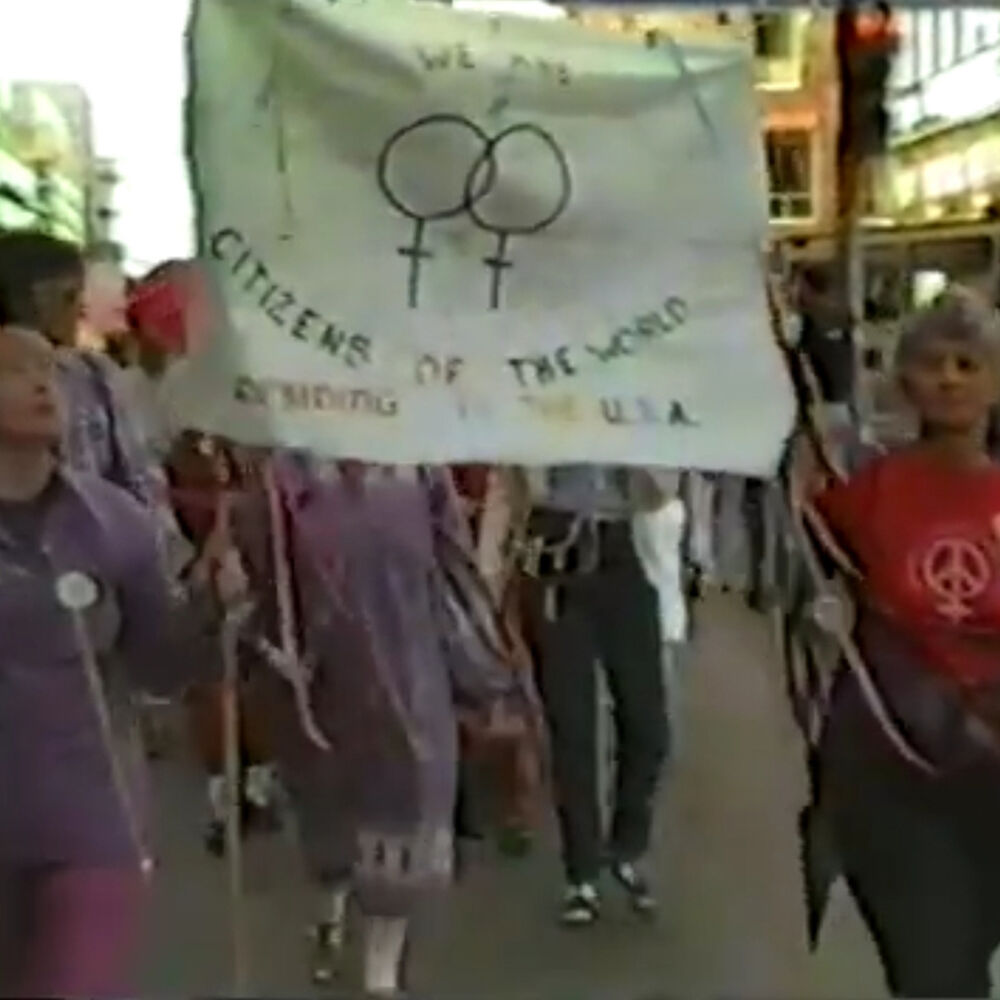Frigörelsedemonstration, Stockholm
Den första svenska demonstrationen för homosexuellas rättigheter hölls 15 maj 1971 i Örebro. Homosexuella Frigörelsehelgen i Stockholm firades första gången 1977. I samband med Frigörelseveckan i slutet av augusti 1979 ockuperade ett 30-tal aktivister Socialstyrelsen för att kräva att homosexualitet skulle strykas från listan med sjukdomsklassifikationer. Tre dagar efter ockupationen filmades följande klipp, och 19 oktober togs sjukdomsklassifikationen för homosexualitet bort.
Sweden 1979 / 3:30
Frigörelsedemonstration, Göteborg
I Göteborg arrangerades den första Homosexuella Frigörelsehelgen i maj 1981, även om demonstrationer hållits i olika sammanhang sedan 1975. I följande klipp från SVT:s Sommarfakta intervjuas Allan Hellman, som var en av grundarna av RFSL år 1950. I programmet syns också Wenche Lowzow, Norges första öppet homosexuella stortingsledamot. 1978 sänktes åldersgränsen för homosexuellt umgänge från 18 till 15 – samma som för heterosexuella – något som nämns i Jan Hammarlunds framträdande med låten Ville.
Sweden 1981 / 13:00
Gay Liberation Week, Stockholm
During the summer of 1981, while preparations for the Gay Liberation Week in Stockholm were underway, the first cases of HIV/AIDS were reported in USA. In Stockholm, one of the themes for the Gay Liberation Week was international solidarity. The first case of HIV in Sweden would be diagnosed in the fall of 1982, and the fight against the virus and new stigmatizations would set its mark on the LGBTQ movement for decades.
Sweden 1981 / 1:45
Gay Liberation Week, Stockholm
Community radio was important for dissemination of LGBTQ news during the 1980’s and 1990’s, and Gay Radio broadcasts were set up in Borås, Gothenburg, Halland, Malmö, Norrköping, Umeå, Örebro – and Stockholm. In the following clip Stockholm Gay Radio mentions a report from a public inquiry on the situation for homosexuals in Swedish society. The report argued for, among other things, anti-discrimination laws, strengthened asylum rights and domestic partnerships for same-sex couples. Many politicians, however, weren’t convinced.
Sweden 1984 / 8:30
A Year of Sisterhood – Interview with Fitt 4 Fight & Queer Feminist March, Stockholm
Originally a nine hours long archival film on the third wave of feminism in Stockholm during one year 2003-2004. It is a document of demonstrations, parties, direct actions and lectures. A year of Sisterhood is an archive, a pool of knowledge and a portrait of its time. The artists’ idea was to write history (her-story) from their own perspective. The Queer Feminist Marches were held 2002-2003 to raise radical issues within the LGBTQ movement. In 2003 Fredrik Reinfeldt – who the previous year voted against same-sex adoption rights and was soon to be head of the conservative party – was inaugural speaker at Stockholm Pride.
Sweden 2005 / 11:00 / Åsa Elzen, Sonia Hedstrand
Lesbian festival, Gothenburg
After talks at Kvinnofolkhögskolan about how to do solidarity work with a lesbian demonstration in Mexico City, the group Lesbian Action was formed. During 2003-2010 they organized an annual Lesbian Festival, with music, debates, parties and demonstrations. When the festival HBT-GBG was scheduled at the same dates in 2007, and marketed as the first LGBT festival in Gothenburg, voices were raised on the invisibilization of lesbians.
Sweden 2005 / 9:30 / Åse Brändström, Camilla Sundkvist
Anti-marriage Action, Gothenburg
Same-sex marriages were legalized in Sweden in 2009. At the end of the Pride parade in Gothenburg the following year, live weddings on the stage were meant to celebrate this. The organizers had difficulties finding a lesbian couple, which made it possible for two queer activists to go undercover and take the opportunity to talk about the limitations of assimilationist politics.
Sweden 2010 / 7:00 / Leo Palmestål
Candle-manifestation, Gothenburg
Questions around police presence at Pride events have been debated since the earliest days of the Pride movement, in the wake of the police raid on Stonewall Inn in 1969. In 2012, a change of the Gothenburg Pride organizers policy on violence prompted activists to creatively highlight what seemed like a double standard. In the film there is a brief clip of a police intervention in the Pride Park a few days earlier, where queer protesters were taken into custody.
Sweden 2012 / 9:00 / Varg Holmdahl
Actions from Queersvall, Sundvall
This is the story of how a small sleepy town in the north of Sweden was one day awakened by a bunch of queer activists. The city woke up and became a mecca for queers. Those who lived in the city had never imagined that there were so many of them.
Sweden 2019 / 6:00 / Eila Wall Boholm
Max Mackhé for Várdobáiki
What would be another meeting for those involved in the Queering Sápmi project instead became the world’s first Sami pride festival, Sápmi Pride. In mid-October 2014, queer Sami gathered in Kiruna for seminars and workshops. The first Sami pride parade attracted about 300 people. Filmed for the Sami channel Márkomáilbmi.
This film program is supported by Holger and Thyra Lauritzens Foundation and Swedish Arts Council.
Sverige Sámi Centre 2014 / 6:00
